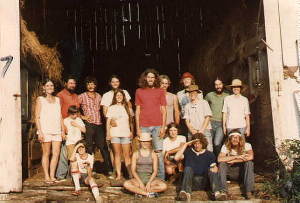
At the Kaufman's School of Homesteading, I particularly
enjoyed discussion at meal time, especially after morning chores.
After field and garden work one of the most enjoyable times I had was going
back to the Kaufman's library at night to read one of the many homesteading
books. Often when we were there reading, Maynard or Sally would come down
stairs also to read. Discussion was not always needed, but I always
felt we mutually approved of gaining further knowledge from books. 
My time at the School of
Homesteading was made very enjoyable by being reunited with Suzzie for
7 months and by meetingl the other students of 1977 and several students
from past years during their visits. I enjoyed spending time with Dan Adams
in particular.
I didn't know I would soon see him again at Michigan
State University.
Homestead Law stated that after five years of occupation, clearing and improvement of the 160 acres, the homesteader gained title to the land. That idea seemed foreign to me, being remote in history and experience. The idea of working the land by myself, assuming full responsibility for success and failure, seemed remote and unattainable now.
So we all have gone our own ways and made a myriad of pathways in the world. This reunion gives us pause to reflect back on the past. But I am not able to come to the event this year so I think that I should take a minute to catch every one up with the past twenty one years and future plans. Here's a brief Vita:
Tim Johnson,
1977, School of Homesteading
1978, B.S. Wilmington College, Agriculture
and Physical Science
1982, M.S. Michigan State, Dairy Science,
Nutrition
1982-1987 Ag Agent, Dairy and Livestock,
St. Clair and Macomb Co., Michigan State University.
1987, Married Karen Sue LaMere, Nature
Center Director, M.S. Fisheries and Wildlife, Michigan State.
1991, Ph.D. University of Wisconsin,
Dairy Science, Nutrition.
1991, Son Paul born.
1991-present, Purdue NE Dairy Specialist,
Instructor Animal Sciences, 2 yr. transfer to Purdue program, and Ag Dean's
Deputy for Fort Wayne Campus, Purdue Ag programs.
Presently I am dealing with Multiple Sclerosis, my job, and trying to be a husband and father from a distance as my wife and son live, work, and go to school in Indianapolis. In 1989 I developed the first symptoms of a neurological disease that was finally diagnosed as Multiple Sclerosis in 1991. I was pretty stable with few remissions for a few years and then started a gradual decline in physical ability. I can still walk but have a wheel chair for anything that requires any walking or standing. In fall of 1997 I had some serious complications and in March 1998, I started on a treatment to slow progression by a weekly I.M. injection of B-Interferon. I notice some improvement in my legs but experience a low threshold of heat stress and the usual side effects following injection. This has been a real challenge to me, taking me a long time to get over denial, and I still feel a lot of anger at the limitations. I hope to be able to get back together with family and continue to work in academics, teaching and counciling.
Presently my appointment is:
Teaching (60%): This includes counciling 65 Ag, Pre Forestry and Pre Veterinary Students at the Indiana Purdue, Fort Wayne branch campus. I teach ANSC 101, Intro. to Animal Science, and ANSC 221, Animal Nutrition.
Extension (20%): Dairy Extension programs, in northern 1/3 of Indiana. Dairy Nutrition, Feeding management, Housing, Expansion plans and business management.
Research (20%):
Nutrition and management of dairy cattle, feeding byproducts and specially
processed silages and grain. Feeding transition cows from dry to
lactating state.
I am located at Indiana Purdue's Fort Wayne campus housed in part of the Department of Biological Sciences. In the future I would like to move to West Lafayette or continue to build a very successful Ag program at the Fort Wayne Campus, recruit more Faculty or Staff to teach in the areas of Agronomy, Soils, and Agricultural Economics and eventually form a whole Ag department. In Fort Wayne we have just moved into a new Science Building and there is a good complement of space with 4 faculty offices and a department secretarial suite office. So far (for 7 years) I have been the only Ag Faculty Purdue has placed at this campus but now with the new building on line for fall classes, that could change, but I am not holding my breath waiting! I would like to extend a invitation and welcome to any of the School of Homesteading graduates who would like to visit or are just passing through Indiana, "Cross Roads of the Nation", as our license plates now read.
My campus phone number in Fort
Wayne is (219) 481-6316.
Sincerely,
Timothy R. Johnson
Back to Homesteading, a Compilation